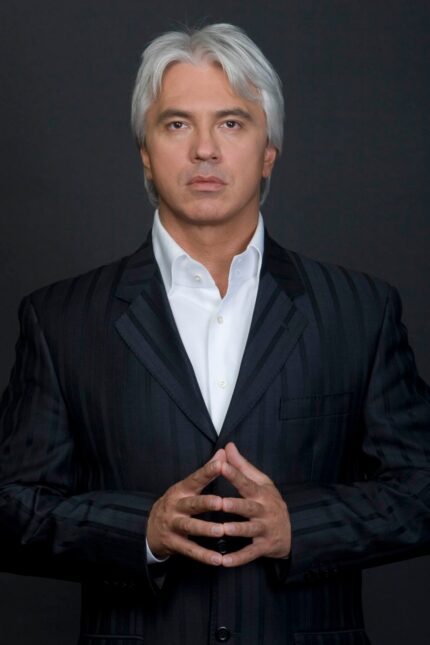Hvorostovsky brings operatic intensity to Russian song

It’s not often that a vocal recital opens with an audience member’s squeal—an actual squeal—when the evening’s artist walks out on stage.
But there are not many singers like Dmitri Hvorostovsky, the preternaturally handsome Russian baritone whose mere presence seems to transform admirers into pop groupies as with the exclamation heard Tuesday night at the Martin Theatre.
Hvorostovsky’s recital of songs by Tchaikovsky, Medtner and Rachmaninoff with pianist Ivari Ilja was the singer’s second Ravinia event in a week, following last Saturday’s concert performance of Rigoletto. With immediate thunderous applause after each selection, Hvorostovsky could do no wrong in the eyes and ears of Tuesday’s audience.
There’s no doubt the combination of the Siberian swain’s authoritative presence, brooding movie-star looks, and innate style in music of his homeland makes a powerful impact on his audiences. At 46, Hvorostovsky’s voice remains a magnificent instrument, a velvety, burnished baritone, evenly produced throughout a wide range, capable of daunting power as well as subtle expression.
Almost two decades ago, Hvorostovsky recorded a disc of Tchaikovsky and Rachmaninoff songs, and his generous opening set of Tchaikovsky romances displayed his idiomatic interpretive touch as well as a still-imposing strength. He brought dark stentorian expression to Why?, a rhapsodic agility to Ah, if only you could for one moment and sailed easily through the high notes of On the golden cornfields. The singer brought a light charming grace to the waltzing Pimpinella, ardent romantic yearning to Tell me, what is in the branches’ shade, and daunting passion and volume in To forget so soon?
The wild card in Tuesday’s program was the set of five songs by Nikolai Medtner. Remembered more for his successful career as a pianist than his own piano music and concertos, Medtner is still regarded, unfairly, as a kind of Rachmaninoff without the tunes, a Late Romantic pianist-composer whose music is unerringly well crafted if a bit dour and unmemorable.
Medtner was a prolific vocal writer, composing over eighty songs, an oeuvre largely shrouded in obscurity, so kudos to Hvorostovsky for serving up these rarities, even though the singer seemed a bit unprepared. In the middle Medtner song, Hvorosovsky had to refresh his memory by looking over Ilja’s score before starting.
These Medtner settings are surprising for their populist bent, and rather than the academic quality the composer is criticized for, if anything, his songs play grandly to the gallery. Hvorstovsky conveyed the dark introspection of the lovely Gone are my heart’s dreams, and handled the very high tessitura of To a dreamer with aplomb. Following the memory lapse, the singer held the final note of Prosperous voyage for what seemed an eternity, to the vociferous delight of the audience.
Yet, as the evening proceeded, one wanted something more subtle and intimate than the reliance on beautiful vocal tone and clarion power. Too many songs were given the same brand of generalized authority without the kind of illumination or word painting many of the settings require.
Hvorostovsky’s closing Rachmaninoff set had its moments, particularly the existential spiritual desolation of Let us rest. Yet the singer’s all-purpose declamatory style was too unvaried for some of these lovely songs and one wanted a more yielding approach, as displayed in Hvorostovsky’s encore of Rachmaninoff’s When night descends.
Ivari Ilja was a complete partner in the evening’s performances, not only prompting Hvorostovsky with the first lines of each setting, but bringing remarkable strength and virtuosity to the knuckle-busting complexity of the Medtner and Rachmaninoff songs. It would be wonderful to have this gifted Estonian pianist back for a solo recital.
Posted in Performances




